GALLUP NEWS SERVICE
PRINCETON, NJ -- The political scandal that began 30 years ago with a break-in at the Watergate complex in Washington, D.C., and that culminated in the 1974 resignation of President Richard Nixon, is still familiar to a majority of Americans, and is by and large viewed harshly.
When given the choice of two ways to describe the Watergate affair, 51% of Americans in a June 7-8 CNN/USA Today/Gallup survey opted for the more critical perspective: that it represented "a very serious matter" because of the corruption it revealed in the Nixon administration. A somewhat smaller number, 42%, chose the more forgiving option: that it was "just politics" of the kind "both parties engage in." These attitudes have changed little since Gallup first measured them on the 10th anniversary of the Watergate break-in, in 1982.
| How Serious Was Watergate? |
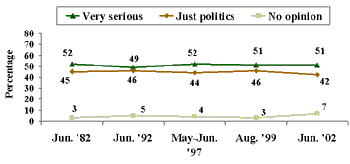 |
Americans' current judgment of Watergate is also very similar to what it was during the height of the controversy. A June 1974 Gallup survey asked the public virtually the same question as that described above and found 48% viewing the situation as very serious and 43% viewing it as "just politics." Only at the very beginning of the publicity surrounding the break-in did a majority of Americans believe Watergate was a case of run-of-the-mill political treachery.
Watergate Still a Household Name
Two-thirds of all Americans tell Gallup they are at least somewhat familiar with the Watergate affair, including nearly one in five (18%) who say they are "very familiar" with it. About one-quarter (24%) report minimal knowledge, saying they are "not too familiar" with the scandal, while 13% say they are not familiar with it at all. These figures have changed very little since Gallup first asked the question in 1992, suggesting that information about Watergate continues to circulate, refreshing older people's memories about the event and informing younger adults.
Naturally, older Americans are more familiar with Watergate than are younger adults but, remarkably, close to half (44%) of those in the 18-29 age category in Gallup's latest survey (all of whom would have been born after the break-in) say they are familiar with it.
| Familiarity With Watergate: By Age |
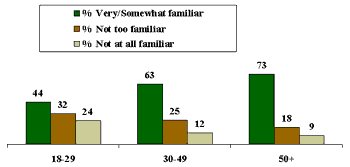 |
| June 7-8, 2002 |
Despite these generational gaps in awareness of Watergate, there are relatively small differences by age in attitudes about the affair. Majorities of those aged 30-49 and 50+, as well as a plurality of those aged 18-29, consider Watergate to have been "a very serious matter," rather than "just politics."
| Opinion About Watergate: By Age |
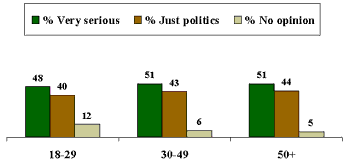 |
| June 7-8, 2002 |
Republicans Carry No Brief for Watergate
Although a Republican president was at the center of the Watergate scandal, current-day Republicans are not especially lenient in their judgment of it. Their views are highly similar to those of independents. Both of these groups are about evenly divided between those describing Watergate as "very serious" and those saying it was "just politics." On the other hand, a solid majority of Democrats (60%) say Watergate was very serious.
| Opinion About Watergate: By Party ID |
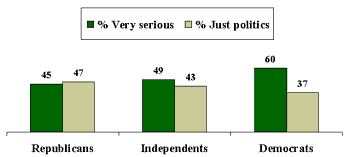 |
| June 7-8, 2002 |
Interestingly, the plurality of Republicans who defend Nixon today contrasts with the number who defended him when these events were occurring. For instance, in June 1974, Gallup polling found sharp disagreement between Republicans and Democrats over whether the charges were serious or not. A majority of Democrats (57%) said they were serious while a majority of Republicans (59%) said they were "just politics."
Knowledge Breeds Contempt?
One group in society -- the highly educated -- stands out above all others as retaining a heightened familiarity with Watergate, and holding particularly critical views about it.
- Close to nine in 10 Americans with postgraduate education say they are familiar with Watergate, including 44% who are "very familiar." Familiarity drops off sharply at lower levels of education, particularly when one looks at the percentage "very familiar": just 20% among college graduates with no postgraduate schooling, 17% among those with only some college education, and just 9% among those with no college education.
- Two-thirds of postgraduate respondents (66%) describe Watergate as very serious. This figure drops to 50% among college graduates and 53% among those with some college. Attitudes switch among those with no college, with the plurality saying Watergate was "just politics."
|
Postgraduate |
College grad only |
Some college |
No college |
|
|
% |
% |
% |
% |
|
|
Very serious |
66 |
50 |
53 |
44 |
|
Just politics |
31 |
44 |
40 |
48 |
The impact of education on views about Watergate appears to be based on more than just the fact that better-educated Americans are more familiar with the scandal. A majority of Americans who are "very familiar" with Watergate as well as a majority of those who are "somewhat familiar" opt for the view that Watergate was very serious. A plurality of those with little to no knowledge of Watergate describe it as "just politics." But the differences among these groups are not as sharp as the differences by educational attainment.
|
Very familiar |
Somewhat familiar |
Not too/Not at all familiar |
|
|
% |
% |
% |
|
|
Very serious |
58 |
56 |
40 |
|
Just politics |
40 |
43 |
44 |
A Slight Recovery
Right up to his death in 1994, President Nixon used his retirement years to try to repair his public image, and successfully carved out a role with several administrations as an elder statesman, visiting other countries and consulting with presidents on foreign affairs. While Nixon may have regained some respect in political circles, Gallup polling suggests that his efforts did little to impress the American public.
A recent Gallup poll found that, in retrospect, only a third of Americans (34%) approve of the job Nixon did as president -- very similar to his approval rate in several surveys conducted since 1990. This approval score is nevertheless slightly higher than his final rating of 24%, taken just days before his resignation on Aug. 9, 1974.
Not only is Nixon's retrospective approval score low, but it is the lowest of all recent presidents. He is also the only president about whom a majority of Americans today say they disapprove. Lyndon Johnson receives low approval as well, but his disapproval score is only 34%, with the remainder saying they have no opinion of him.
| Retrospective Presidential Job Approval |
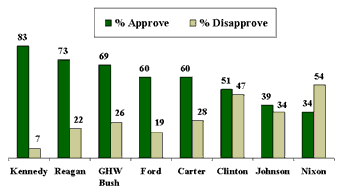 |
| March 18-20, 2002 |
Nixon's Scandal Rated Worse Than Clinton's
One event that may have rejuvenated interest in Watergate is the more recent Bill Clinton-Monica Lewinsky scandal. The allegation that Clinton may have lied under oath about his involvement with this White House intern culminated in Clinton's impeachment (the U.S. Senate later failed to convict him) in 1998. But Gallup polling indicates that Americans view the Nixon scandal as much more serious than the Clinton scandal.
- A November 1999 poll asking Americans to rate the importance of various events of the 20th century found the public rated both Clinton's impeachment and Nixon's involvement in Watergate as far less important than the major wars, scientific discoveries, and various other political events that occurred in the last century. But of the two presidential scandals, the Clinton scandal was perceived as the less serious. Just 40% of Americans described it as important, 24% as somewhat important and 35% as not important. By contrast, 46% described the Nixon resignation as important, 34% as somewhat important, and just 19% as not important.
- Gallup asked Americans in August 1999 to make a direct comparison between the Nixon and Clinton scandals. Given the choice, 54% of respondents in that survey said the Nixon charges were more serious, 14% said the Clinton charges were more serious, and 29% said they were equally serious.
Survey Methods
These results are based on telephone interviews with a randomly selected national sample of 800 adults, 18 years and older, conducted June 7-8, 2002. For results based on this sample, one can say with 95 percent confidence that the maximum error attributable to sampling and other random effects is plus or minus 4 percentage points. In addition to sampling error, question wording and practical difficulties in conducting surveys can introduce error or bias into the findings of public opinion polls.
Now, thinking for a moment about the Watergate affair during President Richard Nixon's administration, how familiar are you with the Watergate affair during the Nixon Administration? Would you say you are -- very familiar, somewhat familiar, not too familiar, or not at all familiar with Watergate?
|
Very |
Somewhat familiar |
Not too familiar |
Not at all familiar |
No |
|
|
% |
% |
% |
% |
% |
|
|
2002 Jun 7-8 |
18 |
45 |
24 |
13 |
* |
|
1999 Aug 3-4 |
21 |
44 |
22 |
13 |
* |
|
1997 May 30-Jun 1 |
17 |
46 |
25 |
11 |
1 |
|
1992 Jun 4-8 |
18 |
47 |
24 |
11 |
* |
|
* Less than 0.5% |
|||||
It has now been 30 years since the break-in at the Watergate. Which of these two statements comes closer to your own point of view about Watergate -- [ROTATED: it was a very serious matter because it revealed corruption in the Nixon Administration (or) it was just politics -- the kind of thing both parties engage in]?
|
Very serious |
Just politics |
No opinion |
||
|
% |
% |
% |
||
|
2002 Jun 7-8 |
51 |
42 |
7 |
|
|
1999 Aug 3-4 |
51 |
46 |
3 |
|
|
1997 May 30-Jun 1 |
52 |
44 |
4 |
|
|
1992 Jun 4-8 |
49 |
46 |
5 |
|
|
1982 Jun 2-3 |
52 |
45 |
3 |
|
|
1999 INTRODUCTION: It has now been 25 years since Richard Nixon resigned as President over the Watergate controversy. |
||||
|
1997 INTRODUCTION: It has now been 25 years since the break-in at the Watergate. |
||||
|
1992 INTRODUCTION: It has now been 20 years since the break-in at the Watergate. |
||||
|
1982 INTRODUCTION: It has now been 10 years since the break-in at the Watergate. |
||||
From what you have heard, read, or remember about some of our past presidents, please tell me if you approve or disapprove of the way each of the following handled their job as president. How about... [RANDOM ORDER]
A. Bill Clinton
|
Approve |
Disapprove |
No opinion |
|
|
% |
% |
% |
|
|
2002 Mar 18-20 |
51 |
47 |
2 |
B. The elder George Bush
|
Approve |
Disapprove |
No opinion |
||
|
% |
% |
% |
||
|
2002 Mar 18-20 |
69 |
26 |
5 |
|
|
2000 Feb 14-15 ^ |
74 |
23 |
3 |
|
|
1999 Feb 8-9 ^ |
76 |
22 |
2 |
|
|
1993 Nov 15-16 ^ |
58 |
40 |
2 |
|
|
^ |
WORDING: George Bush |
|||
C. Ronald Reagan
|
Approve |
Disapprove |
No opinion |
|
|
% |
% |
% |
|
|
2002 Mar 18-20 |
73 |
22 |
5 |
|
2000 Feb 14-15 |
66 |
32 |
2 |
|
1999 Feb 8-9 |
71 |
27 |
2 |
|
1993 Nov 15-16 |
52 |
45 |
3 |
|
1992 Jun 4-8 |
50 |
47 |
3 |
|
1990 Nov 8-11 |
54 |
44 |
2 |
D. Jimmy Carter
|
Approve |
Disapprove |
No opinion |
|
|
% |
% |
% |
|
|
2002 Mar 18-20 |
60 |
28 |
12 |
|
2000 Feb 14-15 |
64 |
31 |
5 |
|
1999 Feb 8-9 |
69 |
27 |
4 |
|
1993 Nov 15-16 |
45 |
50 |
5 |
|
1992 Jun 4-8 |
48 |
46 |
6 |
|
1990 Nov 8-11 |
45 |
52 |
3 |
E. Gerald Ford
|
Approve |
Disapprove |
No opinion |
|
|
% |
% |
% |
|
|
2002 Mar 18-20 |
60 |
19 |
21 |
|
2000 Feb 14-15 |
66 |
25 |
9 |
|
19899 Feb 8-9 |
71 |
22 |
7 |
|
1993 Nov 15-16 |
50 |
33 |
17 |
|
1992 Jun 4-8 |
56 |
29 |
15 |
|
1990 Nov 8-11 |
55 |
34 |
11 |
F. Richard Nixon
|
Approve |
Disapprove |
No opinion |
|
|
% |
% |
% |
|
|
2002 Mar 18-20 |
34 |
54 |
12 |
|
2000 Feb 14-15 |
31 |
65 |
4 |
|
1999 Feb 8-9 |
34 |
63 |
3 |
|
1993 Nov 15-16 |
37 |
56 |
7 |
|
1992 Jun 4-8 |
35 |
59 |
6 |
|
1990 Nov 8-11 |
32 |
62 |
6 |
G. Lyndon Johnson
|
Approve |
Disapprove |
No opinion |
|
|
% |
% |
% |
|
|
2002 Mar 18-20 |
39 |
34 |
27 |
|
2000 Feb 14-15 |
48 |
39 |
13 |
|
1999 Feb 8-9 |
45 |
45 |
10 |
|
1993 Nov 15-16 |
35 |
43 |
22 |
|
1992 Jun 4-8 |
35 |
45 |
20 |
|
1990 Nov 8-11 |
40 |
43 |
17 |
H. John F. Kennedy
|
Approve |
Disapprove |
No opinion |
|
|
% |
% |
% |
|
|
2002 Mar 18-20 |
83 |
7 |
10 |
|
2000 Feb 14-15 |
86 |
10 |
4 |
|
1999 Feb 8-9 |
85 |
13 |
2 |
|
1993 Nov 15-16 |
78 |
13 |
9 |
|
1992 Jun 4-8 |
76 |
14 |
10 |
|
1990 Nov 8-11 |
84 |
9 |
7 |
SUMMARY TABLE: RETROSPECTIVE PRESIDENTIAL JOB APPROVAL
|
2002 Mar 18-20 |
Approve |
Disapprove |
|
% |
% |
|
|
John F. Kennedy |
83 |
7 |
|
Ronald Reagan |
73 |
22 |
|
The elder George Bush |
69 |
26 |
|
Gerald Ford |
60 |
19 |
|
Jimmy Carter |
60 |
28 |
|
Bill Clinton |
51 |
47 |
|
Lyndon Johnson |
39 |
34 |
|
Richard Nixon |
34 |
54 |
Now I'm going to read you a list of events which have occurred this century. For each one, please tell me if you consider that event to be one of the MOST important events of the century, important but not the MOST important, somewhat important, or not important. First, ... How about ... [RANDOM ORDER]
BASED ON -- 489 -- NATIONAL ADULTS IN FORM A; ± 5 PCT PTS
|
One of most impor-tant |
|
|
|
|
|
|
% |
% |
% |
% |
% |
|
|
World War II |
71 |
21 |
5 |
2 |
1 |
|
Women gaining the right to vote in 1920 |
66 |
20 |
11 |
3 |
0 |
|
Dropping the atomic bomb on Hiroshima in 1945 |
66 |
20 |
9 |
4 |
1 |
|
The Nazi Holocaust during World War II |
65 |
20 |
9 |
5 |
1 |
|
Passage of the 1964 Civil Rights Act |
58 |
26 |
13 |
2 |
1 |
|
World War I |
53 |
28 |
11 |
5 |
3 |
|
Landing a man on the moon in 1969 |
50 |
30 |
15 |
5 |
* |
|
The assassination of President Kennedy in 1963 |
50 |
29 |
15 |
5 |
1 |
|
The fall of the Berlin Wall in 1989 |
48 |
30 |
19 |
3 |
0 |
|
The U.S. Depression in the 1930s |
48 |
29 |
18 |
3 |
2 |
|
The breakup of the Soviet Union in the early 1990s |
46 |
31 |
19 |
3 |
1 |
|
The Vietnam War in the 1960s and early 1970s |
37 |
31 |
20 |
11 |
1 |
|
Charles Lindbergh's transatlantic flight in 1927 |
27 |
33 |
28 |
11 |
1 |
|
The launching of the Russian Sputnik satellites in the 1950s |
25 |
34 |
28 |
12 |
1 |
|
The Korean War in the early 1950s |
21 |
36 |
32 |
10 |
1 |
|
The Persian Gulf War in 1991 |
18 |
38 |
32 |
11 |
1 |
|
The Impeachment of President Bill Clinton in 1998 |
15 |
25 |
24 |
35 |
1 |
|
The Watergate scandal involving Richard Nixon in the 1970s |
14 |
32 |
34 |
19 |
1 |
|
* Less than 0.5% |
|||||
Comparing the impeachment charges against Bill Clinton over the Lewinsky controversy with the charges against Richard Nixon in the Watergate controversy, which do you think were more serious: [ROTATE 1-2-3/2-1-3: 1) The charges against Richard Nixon, 2) The charges against Bill Clinton, 3) or do you think the charges against both men were about equally serious]?
|
Nixon charges more serious |
Clinton charges more serious |
|
|
|
|
1999 Aug 3-4 |
54% |
14 |
29 |
3 |
|
1998 Oct 6-7 |
64% |
10 |
23 |
3 |
